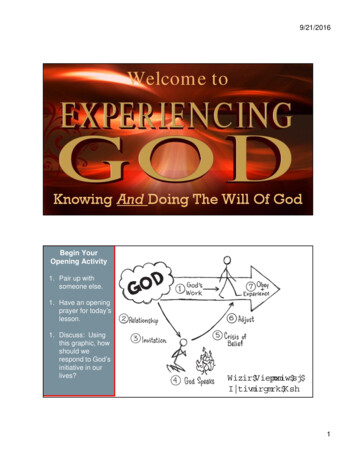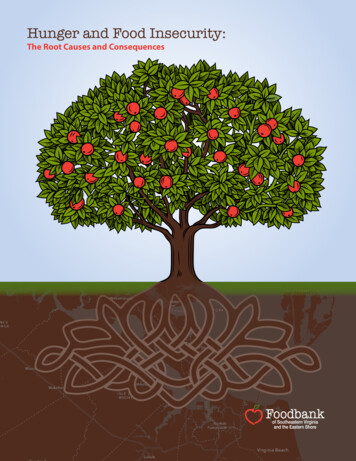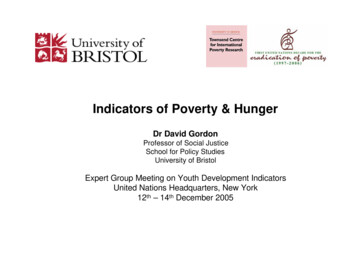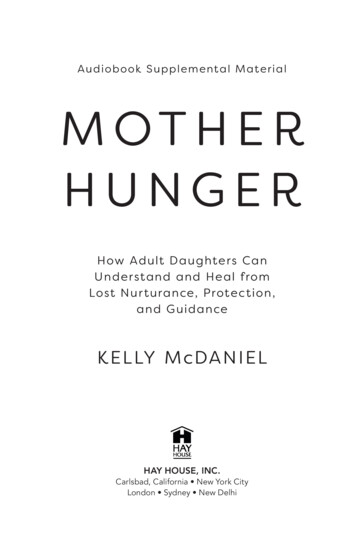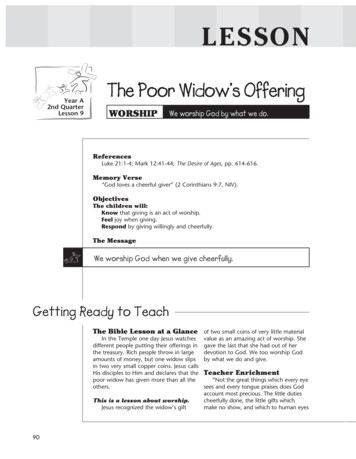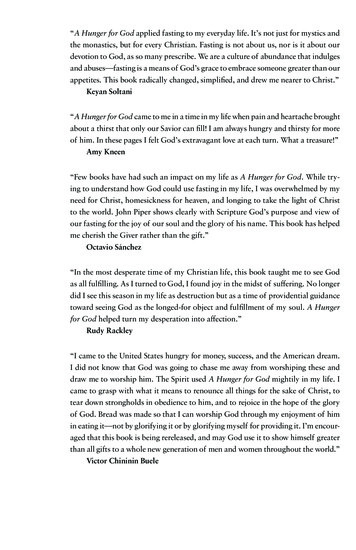
Transcription
“A Hunger for God applied fasting to my everyday life. It’s not just for mystics andthe monastics, but for every Christian. Fasting is not about us, nor is it about ourdevotion to God, as so many prescribe. We are a culture of abundance that indulgesand abuses—fasting is a means of God’s grace to embrace someone greater than ourappetites. This book radically changed, simplified, and drew me nearer to Christ.”Keyan Soltani“A Hunger for God came to me in a time in my life when pain and heartache broughtabout a thirst that only our Savior can fill! I am always hungry and thirsty for moreof him. In these pages I felt God’s extravagant love at each turn. What a treasure!”Amy Kneen“Few books have had such an impact on my life as A Hunger for God. While trying to understand how God could use fasting in my life, I was overwhelmed by myneed for Christ, homesickness for heaven, and longing to take the light of Christto the world. John Piper shows clearly with Scripture God’s purpose and view ofour fasting for the joy of our soul and the glory of his name. This book has helpedme cherish the Giver rather than the gift.”Octavio Sánchez“In the most desperate time of my Christian life, this book taught me to see Godas all fulfilling. As I turned to God, I found joy in the midst of suffering. No longerdid I see this season in my life as destruction but as a time of providential guidancetoward seeing God as the longed-for object and fulfillment of my soul. A Hungerfor God helped turn my desperation into affection.”Rudy Rackley“I came to the United States hungry for money, success, and the American dream.I did not know that God was going to chase me away from worshiping these anddraw me to worship him. The Spirit used A Hunger for God mightily in my life. Icame to grasp with what it means to renounce all things for the sake of Christ, totear down strongholds in obedience to him, and to rejoice in the hope of the gloryof God. Bread was made so that I can worship God through my enjoyment of himin eating it—not by glorifying it or by glorifying myself for providing it. I’m encouraged that this book is being rereleased, and may God use it to show himself greaterthan all gifts to a whole new generation of men and women throughout the world.”Victor Chininin BueleHunger for God.537264.i02.indd 13/8/13
A SELECTION OF CROSSWAY TITLESBY JOHN PIPERBloodlines: Race, Cross, and the Christian, 2011Think: The Life of the Mind and the Love of God, 2010A Sweet and Bitter Providence:Sex, Race, and the Sovereignty of God, 2010Spectacular Sins:And Their Global Purpose in the Glory of Christ, 2008When the Darkness Will Not Lift:Doing What We Can While We Wait for God—and Joy, 2007What Jesus Demands from the World, 2006Fifty Reasons Why Jesus Came to Die, 2006Seeing and Savoring Jesus Christ, 2004When I Don’t Desire God: How to Fight for Joy, 2004Don’t Waste Your Life, 2003Hunger for God.537264.i02.indd 23/8/13
AHUNGERforGODDesiring God through Fasting and PrayerJOHN PIPERFOREWORDBYDAVID PLATTANDFRANCIS CHANW H E AT O N , I L L I N O I SHunger for God.537264.i02.indd 33/8/13
A Hunger for God: Desiring God through Fasting and PrayerCopyright 1997, 2013 by Desiring God FoundationPublished by Crossway1300 Crescent StreetWheaton, Illinois 60187All rights reserved. No part of this publication may be reproduced, stored in a retrievalsystem, or transmitted in any form by any means, electronic, mechanical, photocopy,recording, or otherwise, without the prior permission of the publisher, except as providedfor by USA copyright law.Cover design: Erik MaldreFirst printing 1997First printing redesign 2013Printed in the United States of AmericaUnless otherwise indicated, Scripture quotations are from the ESV Bible (The Holy Bible,English Standard Version ), copyright 2001 by Crossway. 2011 Text Edition. Used bypermission. All rights reserved.Scripture quotations marked at are the author’s translation.Scripture quotations marked kjv are from the King James Version of the Bible.Scripture references marked rsv are from The Revised Standard Version. Copyright 1946,1952, 1971, 1973 by the Division of Christian Education of the National Council of theChurches of Christ in the U.S.A.All emphases in Scripture quotations have been added by the author.Library of Congress Cataloging-in-Publication DataPiper, John, 1946–A hunger for God : desiring God through fasting and prayer / JohnPiper ; foreword by David Platt and Francis Chan.p. cmOriginally published: Wheaton, Ill. : Crossway Books, c1997. Includesbibliographical references and index.ISBN 978-1-4335-3726-41. Fasting—Religious aspects—Christianity. 2. Prayer—Christianity.3. Desire for God. I. Title.BV5055.P57 2013248.4'7—dc232012043970Crossway is a publishing ministry of Good News Publishers.VP151423132212Hunger for God.537264.i02.indd 421112010191898717616515414321313/8/13
To the eldersof Bethlehem Baptist Church,with whom I hungeredfor the fullness of God,and feasted at the table of grace.Hunger for God.537264.i02.indd 53/8/13
Hunger for God.537264.i02.indd 63/8/13
CON T EN TSForeword by Francis Chan and David Platt9Preface13Introduction: A Homesickness for God171 IS FASTING CHRISTIAN?New Fasting for the New Wine292 MAN SHALL NOT LIVE BY BREAD ALONEThe Desert Feast of Fasting513 FASTING FOR THE REWARD OF THE FATHERJesus’ Radical God-Orientation in Fasting654 FASTING FOR THE KING’S COMINGHow Much Do We Miss Him?795 FASTING AND THE COURSE OF HISTORYA Call for Discernment and Desire936 FINDING GOD IN THE GARDEN OF PAINA Different Fast for the Sake of the Poor1157 FASTING FOR THE LITTLE ONESAbortion and the Sovereignty of God Over False Worldviews141Conclusion: Why Does God Reward Fasting?157Appendix: Quotes and Experiences165Bibliography181Notes183Scripture Index191Person Index197Subject Index199Desiring God: A Note on Resources203Hunger for God.537264.i02.indd 73/8/13
Hunger for God.537264.i02.indd 83/8/13
FOR E WOR DAs we look out at the church today, there is so much that encouragesus and fills us with gratitude. There is renewed zeal among God’s people for the spread of God’s glory across the earth. Like never beforewe hear brothers and sisters in different circles and different streamsof contemporary Christianity talking about the gospel and mission,about transforming cities and reaching unreached people groups. Theseconversations are essential, and we hope they will continue with evengreater intensity and intentionality in the days ahead.But sometimes what we are not hearing can be as illuminatingas what we do hear. It reminds us of an exchange in an old SherlockHolmes mystery, where Holmes refers to “the curious incident of thedog in the night-time” during a robbery. A fellow detective, confusedat Holmes’s comment, responds that “the dog did nothing in the nighttime”—to which Holmes responds: “That was the curious incident.”Despite the proliferation of Christian publishing and Christian conferences, J. I. Packer’s observation of our own curious incident still ringstrue:When Christians meet, they talk to each other about their Christianwork and Christian interests, their Christian acquaintances, the stateof the churches, and the problems of theology—but rarely of theirdaily experience of God.Modern Christian books and magazines contain much aboutChristian doctrine, Christian standards, problems of Christian conduct, techniques of Christian service—but little about the inner realities of fellowship with God.Our sermons contain much sound doctrine—but little relatingto the converse between the soul and the Saviour.We do not spend much time, alone or together, in dwelling onthe wonder of the fact that God and sinners have communion at all;no, we just take that for granted, and give our minds to other matters.9Hunger for God.537264.i02.indd 93/8/13
ForewordThus we make it plain that communion with God is a smallthing to us.1Think about it. Where are the passionate conversations today aboutcommuning with God through fasting and prayer? We seem to find iteasier to talk much of plans and principles for proclaiming the gospeland planting churches, and to talk little of the power of God that isnecessary for this gospel to be proclaimed and the church to be planted.If we really want to be a part of seeing disciples made and churchesmultiplied throughout North America and to the ends of the earth, wewould be wise to begin on our knees.It is for this reason that we gladly commend this new edition ofJohn Piper’s Hunger for God. If you have read or heard anything fromPiper, you know that he is rightly and biblically passionate about thespread of God’s glory. But at the same time, he is acutely and biblicallyaware of our need for God’s grace. He knows that apart from dependence on and desperation for God, we will not only miss the ultimatepoint of our mission, but we will also neglect the ultimate need of oursouls.We were made to feast on God. In the words of the psalmist, wewere created to cry:O God, you are my God; earnestly I seek you;my soul thirsts for you;my flesh faints for you,as in a dry and weary land where there is no water.So I have looked upon you in the sanctuary,beholding your power and glory.Because your steadfast love is better than life,my lips will praise you.So I will bless you as long as I live;in your name I will lift up my hands.My soul will be satisfied as with fat and rich food. (Psalm 63:1–5)We have read the sad statistics about the number of young peoplewho turn away from the church once they are out of their parents’home. We have heard people explain that they have “tried God” when10Hunger for God.537264.i02.indd 103/8/13
Forewordthey were young but that it didn’t work for them. But we have to wonder: did they “earnestly” seek him with their whole hearts? Did they cryout to him in fasting and prayer? Sometimes we “earnestly seek” afterthings from God rather than God himself. It is hard for us to imagineanyone leaving the presence of the living God—the maker and sustainerof heaven and earth—and looking for something better!There is spiritual delight to be found in God that far supersedes thephysical diet of this world, and fasting is the means by which we say toGod, “More than our stomachs want food, our souls want you.” Oncewe “taste and see that the Lord is good” (Psalm 34:8), the things of theworld no longer appeal to us in the same way.As Piper says in the opening pages of this book, “Beware of bookson fasting.” This is not a book of legalism. It’s not a book of technique.It does not contain a twelve-step plan. At the end of the day, it’s a bookmore about our hearts than about our stomachs. Abstaining from food(or other things) for a period of time is not an end in itself but a meansto cause us to learn about and increase our love for Christ. As Piperexplains in this book, the Bible gives us many reasons to fast: We fast because we’re hungry for God’s Word and God’s Spirit inour lives. We fast because we long for God’s glory to resound in the churchand God’s praise to resound among the nations. We fast because we yearn for God’s Son to return and God’s kingdom to come. Ultimately we fast simply because we want God more than we wantanything this world has to offer us.Few things are as frustrating as trying to convince our loved onesof the greatness and grandeur of God. We are jealous for our neighbors and our faith family and the nations to find satisfaction in Godalone. As we recently reread the book you hold in your hands, we havetried to imagine what it would be like if our churches were filled withbelievers fasting regularly and biblically. What might God be pleased11Hunger for God.537264.i02.indd 113/8/13
Forewordto do if his church rises up to say, “This much, O God, we want you!”?We encourage you to read this book, asking great things from God,“who is able to do far more abundantly than all that we ask or think!”(Ephesians 3:20).Francis Chan and David PlattThe Multiply Movement12Hunger for God.537264.i02.indd 123/8/13
PR EFACEBeware of books on fasting. The Bible is very careful to warn us aboutpeople who “require abstinence from foods that God created to be receivedwith thanksgiving by those who believe and know the truth” (1 Timothy4:1–3). The apostle Paul asks with dismay, “Why . . . do you submit toregulations—‘Do not handle, Do not taste, Do not touch’?” (Colossians2:20–21). He is jealous for the full enjoyment of Christian liberty. Like agreat declaration of freedom over every book on fasting flies the banner,“Food will not commend us to God. We are no worse off if we do not eat,and no better off if we do” (1 Corinthians 8:8). There once were two men.One said, “I fast twice a week”; the other said, “God, be merciful to me,a sinner!” Only one went down to his house justified (Luke 18:12–14).The discipline of self-denial is fraught with dangers—perhapsonly surpassed by the dangers of indulgence. These also we are warnedabout: “‘All things are lawful for me,’ but I will not be dominated byanything” (1 Corinthians 6:12). What masters us has become our god;and Paul warns us about those whose “god is their belly” (Philippians 3:19). Appetite dictates the direction of their lives. The stomach issovereign. This has a religious expression and an irreligious one. Religiously, “ungodly people . . . pervert the grace of our God into sensuality” (Jude 4) and tout the slogan, “Food is meant for the stomach andthe stomach for food” (1 Corinthians 6:13). Irreligiously, with no pretext of pardoning grace, persons simply yield to “the desires for otherthings [that] enter in and choke the word” (Mark 4:19).“Desires for other things”—there’s the enemy. And the onlyweapon that will triumph is a deeper hunger for God. The weaknessof our hunger for God is not because he is unsavory, but because wekeep ourselves stuffed with “other things.” Perhaps, then, the denial ofour stomach’s appetite for food might express, or even increase, oursoul’s appetite for God.13Hunger for God.537264.i02.indd 133/8/13
PrefaceWhat is at stake here is not just the good of our souls, but also theglory of God. God is most glorified in us when we are most satisfiedin him. The fight of faith is a fight to feast on all that God is for us inChrist. What we hunger for most, we worship.His goodness shines with brightest raysWhen we delight in all his ways.His glory overflows its rimWhen we are satisfied in him.His radiance will fill the earthWhen people revel in his worth.The beauty of God’s holy fireBurns brightest in the heart’s desire.Between the dangers of self-denial and self-indulgence there is apath of pleasant pain. It is not the pathological pleasure of a masochist,but the passion of a lover’s quest: “I have suffered the loss of all thingsand count them as rubbish, in order that I may gain Christ” (Philippians 3:8). That is the path we will try to follow in this book.That I could even attempt the journey is owing to God’s grace, whichI live on every day. It has come to me in Jesus who loved me and gavehimself for me. It has come to me in my wife, Noël, who supports me inthe work of preaching and writing and tending the flock. I love you, Noël,and thank you for your partnership in the great work. God has beengood to us. Grace has come to me again in the faithful labors of CarolSteinbach, whose careful reading has left its mark, and whose industrycreated the indexes. And grace has come to me through my fellow eldersat Bethlehem Baptist Church. They forged a mission statement for ourchurch that I embrace as the mission of my life. And they gave me thecharge and the time to write this book and make it a part of that mission:“We exist to spread a passion for the supremacy of God in all things forthe joy of all peoples.” That is my prayer for this book. When God is thesupreme hunger of our hearts, he will be supreme in everything.John PiperMay 1, 199714Hunger for God.537264.i02.indd 143/8/13
Hunger for God.537264.i02.indd 153/8/13
Whom have I in heaven but you?And there is nothing upon earth that I desire besides you.My flesh and my heart may fail,but God is the strength of my heart and my portion for ever.P SALM 73:25–26Almost everywhere at all times fasting has held a placeof great importance since it is closely linked with theintimate sense of religion. Perhaps this is theexplanation for the demise of fasting in our day.When the sense of God diminishes, fasting disappears.E DWARD F ARRELL 1Hunger for God.537264.i02.indd 163/8/13
I N T R ODUCT IONA Homesickness for GodThe birthplace of Christian fasting is homesickness for God. In thesummer of 1967 I had been in love with Noël for a whole year. If youhad told me then that we would have to wait another year and a halfto marry, I would have protested firmly. For us, it seemed, the soonerthe better. It was the summer before my senior year in college. I wasworking as a water safety instructor at a Christian athletic camp inSouth Carolina. She was hundreds of miles away working as a waitress.Never had I known an aching like this one. I had been homesickbefore, but never like this. Every day I would write her a letter and talkabout this longing. In the late morning, just before lunch, there wouldbe mail call. When I heard my name and saw the lavender envelope, myappetite would be taken away. Or, more accurately, my hunger for foodwas silenced by the hunger of my heart. Often, instead of eating lunchwith the campers, I would take the letter to a quiet place in the woodsand sit down on the leaves for a different kind of meal. It wasn’t thereal thing. But the color, the smell, the script, the message, the signaturewere foretastes. And with them, week by week, I was strengthened inhope, and the reality just over the horizon was kept alive in my heart.The Romance and the Resistance of FastingChristian fasting, at its root, is the hunger of a homesickness for God.But the story of my heart-hunger to be with Noël could be misleading. It tells only half the story of Christian fasting. Half of Christianfasting is that our physical appetite is lost because our homesicknessfor God is so intense. The other half is that our homesickness for God17Hunger for God.537264.i02.indd 173/8/13
Introductionis threatened because our physical appetites are so intense. In the firsthalf, appetite is lost. In the second half, appetite is resisted. In the first,we yield to the higher hunger that is. In the second, we fight for thehigher hunger that isn’t. Christian fasting is not only the spontaneous effect of a superior satisfaction in God; it is also a chosen weaponagainst every force in the world that would take that satisfaction away.God’s Greatest Adversaries Are His GiftsThe greatest enemy of hunger for God is not poison but apple pie. It isnot the banquet of the wicked that dulls our appetite for heaven, butendless nibbling at the table of the world. It is not the X-rated video,but the prime-time dribble of triviality we drink in every night. For allthe ill that Satan can do, when God describes what keeps us from thebanquet table of his love, it is a piece of land, a yoke of oxen, and awife (Luke 14:18–20). The greatest adversary of love to God is not hisenemies but his gifts. And the most deadly appetites are not for thepoison of evil, but for the simple pleasures of earth. For when thesereplace an appetite for God himself, the idolatry is scarcely recognizable, and almost incurable.Jesus said some people hear the word of God, and a desire for Godis awakened in their hearts. But then, “as they go on their way they arechoked by the cares and riches and pleasures of life” (Luke 8:14). Inanother place he said, “The desires for other things enter in and chokethe word, and it proves unfruitful” (Mark 4:19). “The pleasures of life”and “the desires for other things”—these are not evil in themselves.These are not vices. These are gifts of God. They are your basic meatand potatoes and coffee and gardening and reading and decoratingand traveling and investing and TV-watching and Internet-surfing andshopping and exercising and collecting and talking. And all of them canbecome deadly substitutes for God.The Deadening Effects of Innocent DelightsTherefore, when I say that the root of Christian fasting is the hunger ofhomesickness for God, I mean that we will do anything and go without18Hunger for God.537264.i02.indd 183/8/13
Introductionanything if, by any means, we might protect ourselves from the deadening effects of innocent delights and preserve the sweet longings of ourhomesickness for God. Not just food, but anything. Several years agoI called our people to fast for a twenty-four-hour period once a week(breakfast and lunch on Wednesdays, if possible) during the month ofJanuary. We were facing huge issues of self-assessment and direction,and we needed the fullness of God’s presence with all his wisdom andpurifying power. Within a few days I got this note in the mail:I’m behind this. I think God is in it. It doesn’t work for me on Wednesday. I’m with people over lunch every day. So I have a couple of thingsI believe are from the Spirit that may be more of a fast for some thanfood. I thought not watching television for a week, or for a month,or a night of the week when I normally watch it, might be more ofa fast than food. Instead of watching my favorite program, I mightspend the time talking and listening to God. I wonder if there mightbe others for whom this would be a fast and would be a focused timeof prayer to them.I said to the congregation the next Sunday, “Amen. If you say, ‘Fasting on Wednesday doesn’t work for me,’ that’s okay. If your heart isright and you’re open to the Lord and you’re asking him, ‘Lord, drawme into the spirit of awakening through fasting,’ he will show you.He’ll show you when and how. If your health doesn’t allow for that, ifthe doctor says, ‘No fasting for you,’ that’s fine. The Great Physicianknows all about that, and something else will work for you.”The issue is not food per se. The issue is anything and everythingthat is, or can be, a substitute for God. Martyn Lloyd-Jones (1899–1981), the pastor of Westminster Chapel in London, delivered a greatsermon on fasting when he was preaching through the Sermon on theMount in 1959–1960. In it he said,Fasting if we conceive of it truly, must not . . . be confined to thequestion of food and drink; fasting should really be made to includeabstinence from anything which is legitimate in and of itself for thesake of some special spiritual purpose. There are many bodily functions which are right and normal and perfectly legitimate, but which19Hunger for God.537264.i02.indd 193/8/13
Introductionfor special peculiar reasons in certain circumstances should be controlled. That is fasting.2My assumption so far has been that good things can do great damage. Oxen and fields and marriage can keep you out of the kingdomof heaven. Which is why Jesus says, “No one of you can be my disciplewho does not bid farewell to all his own possessions” (Luke 14:33 at3).Anything can stand in the way of true discipleship—not just evil, andnot just food, but anything. Nor should it be surprising that the greatestcompetitors for our devotion and affection for God would be some ofhis most precious gifts.When Abraham Preferred God to the Life of His SonHow does fasting help us keep from turning gifts into gods? Considerthe almost-sacrifice of Isaac by his father Abraham. When Abrahamhad stretched out his hand to kill his son and the heir of God’s promise,“the angel of the Lord called to him from heaven and said, ‘Abraham,Abraham!’ And he said, ‘Here I am.’ He said, ‘Do not lay your hand onthe boy or do anything to him, for now I know that you fear God, seeing you have not withheld your son, your only son, from me’” (Genesis22:11–12). Now here was a radical kind of fast: the sacrifice of a son.God did not call for this “fast” because Isaac was evil. On the contrary,it was because in Abraham’s eyes he was so good. Indeed he seemedindispensable for the fulfillment of God’s promise. Fasting is not theforfeit of evil but of good.But why would God call for such a thing? Because it was a test.Does Abraham delight in the fear of the Lord (Isaiah 11:3) more thanhe delights in his own son? God spoke through the angel: “Now I knowthat you fear God, seeing you have not withheld your son, your onlyson, from me.” These words, “now I know”—what do they mean? DidGod not know that Abraham was a God-fearing man and that he valued God above his son? The Bible teaches that God knows the heartsof all men (1 Kings 8:39; Acts 1:24); indeed, he “fashions the hearts ofthem all” (Psalm 33:15). Why then the test? Here is the way C. S. Lewisanswers the question:20Hunger for God.537264.i02.indd 203/8/13
Introduction[I am concerned with the question] “If God is omniscient he musthave known what Abraham would do, without any experiment; why,then, this needless torture?” But as St. Augustine points out, whateverGod knew, Abraham at any rate did not know that this obediencewould endure such a command until the event taught him; and theobedience which he did not know that he would choose, he cannot besaid to have chosen. The reality of Abraham’s obedience was the actitself; and what God knew in knowing that Abraham “would obey”was Abraham’s actual obedience on that mountain top at that moment. To say that God “need not have tried the experiment” is to saythat because God knows, the thing known by God need not exist.4God wills to know the actual, lived-out reality of our preference forhim over all things. And he wills that we have the testimony of our ownauthenticity through acts of actual preference of God over his gifts.Lewis is right that God may as well not have created the world, but onlyimagined it, if his knowing what “would be” is as good as his knowingit in the very act. God wills that he have an experiential-knowing, an actual seeing-knowing, a watching-knowing. A real lived-out human actof preference for God over his gifts is the actual lived-out glorificationof God’s excellence for which he created the world. Fasting is not theonly way, or the main way, that we glorify God in preferring him abovehis gifts. But it is one way. And it is a way that can serve all the others.Eating as the Anesthesia of SadnessLewis referred to St. Augustine. What Augustine said was this: “For themost part, the human mind cannot attain to self-knowledge otherwisethan by making trial of its powers through temptation, by some kindof experimental and not merely verbal self-interrogation.”5 In otherwords, we easily deceive ourselves that we love God unless our love isfrequently put to the test, and we must show our preferences not merelywith words but with sacrifice. Admittedly the sacrifice of a son saysmore than the sacrifice of a sandwich. But the principle is the same.And many small acts of preferring fellowship with God above food canform a habit of communion and contentment that makes one ready forthe ultimate sacrifice. This is one way that fasting serves all our acts of21Hunger for God.537264.i02.indd 213/8/13
Introductionlove to God. It keeps the preferring faculty on alert and sharp. It doesnot let the issue rest. It forces us to ask repeatedly: do I really hunger forGod? Do I miss him? Do I long for him? Or have I begun to be contentwith his gifts?Christian fasting is a test to see what desires control us. What areour bottom-line passions? In his chapter on fasting in Celebration ofDiscipline, Richard Foster says, “More than any other discipline, fasting reveals the things that control us. This is a wonderful benefit tothe true disciple who longs to be transformed into the image of JesusChrist. We cover up what is inside of us with food and other things.”6Psychologically, that sort of thing is spoken of a lot today, especiallyin regard to people who have much pain in their lives. We would saythey “medicate” their pain with food. They anesthetize themselves tothe hurt inside by eating. But this is not some rare, technical syndrome.All of us do it. Everybody. No exceptions. We all ease our discomfortusing food and cover our unhappiness by setting our eyes on dinnertime. Which is why fasting exposes all of us—our pain, our pride, ouranger. Foster continues:If pride controls us, it will be revealed almost immediately. Davidsaid, “I humbled my soul with fasting” [Psalm 35:13]. Anger, bitterness, jealousy, strife, fear—if they are within us, they will surfaceduring fasting. At first, we will rationalize that our anger is due to ourhunger. And then, we know that we are angry because the spirit ofanger is within us. We can rejoice in this knowledge because we knowthat healing is available through the power of Christ.7One of the reasons for fasting is to know what is in us—just asAbraham showed what was in him. In fasting it will come out. You willsee it. And you will have to deal with it or quickly smother it again.When midmorning comes and you want food so badly that the thoughtof lunch becomes as sweet as a summer vacation, then suddenly yourealize, “Oh, I forgot, I made a commitment. I can’t have that pleasure.I’m fasting for lunch too.” Then what are you going to do with all theunhappiness inside? Formerly, you blocked it out with the hope of atasty lunch. The hope of food gave you the good feelings to balance22Hunger for God.537264.i02.indd 223/8/13
Introductionout the bad feelings. But now the balance is off. You must find anotherway to deal with it.The Hungry Handmaid of FaithAt these points we really begin to discover what our spiritual resourcesare. The things I discover about my soul are so valuable for the fightof faith. I almost subtitled this book: Fasting—the Hungry Handmaidof Faith. What a servant she is! Humbly and quietly, with scarcely amovement, she brings up out of the dark places of my soul the dissatisfactions in relationships, the frustrations of the ministry, the fears offailure, the emptin
A hunger for God : desiring God through fasting and prayer / John Piper ; foreword by David Platt and Francis Chan. p. cm Originally published: Wheaton, Ill. : Crossway Books, c1997. Includes bibliographical references and index. ISBN 978-1-4335-3726-4 1. Fasting—R


